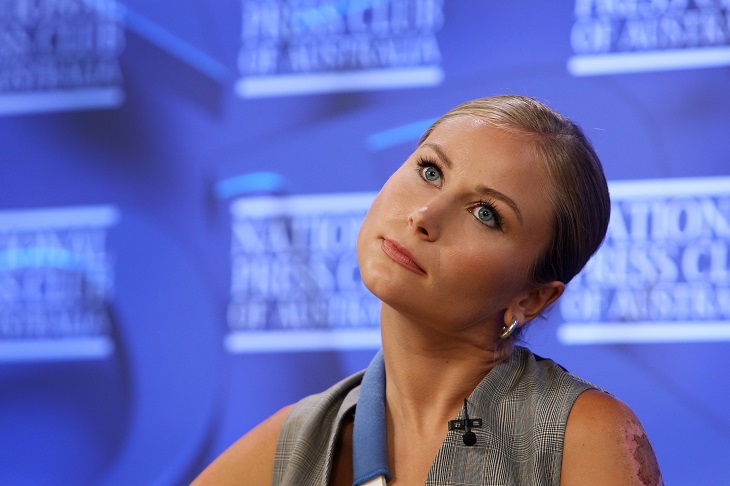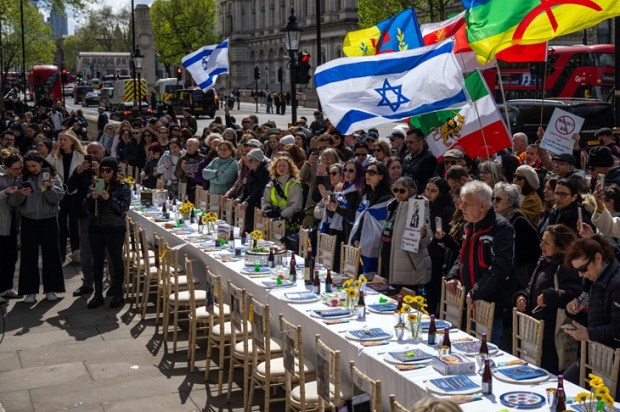Following leaked text messages showing the way politicians can talk behind closed doors, Grace Tame’s rudeness towards the Prime Minister, and appalling behaviour by both some players and members of the crowd at the Australian Open – civility is on the agenda.
To take just one example from recent analysis, Peter van Onselen grieved for a ‘lost civility’.
Fair enough. It would be far better if politicians could communicate with one another in a vaguely respectful way. The snub that the former Australian of the Year delivered to Mr Morrison at The Lodge was striking in its brashness. And the petulance of numerous – predominantly male – players at the Australian Open shocked many of us (even those of us used to the outbursts of entitled, talentless man-babies of the ilk of Bernard Tomic).
Men’s finalist Danil Medvedev was a frequent offender, yet his treatment at the hands of some spectators was unwarranted.
Professor van Onselen’s contribution to the discussion about civility was noteworthy. After all, he had been eviscerated by the Twitter mob after writing a perfectly appropriate piece about Grace Tame’s petulance.
He recanted, in depressingly predictable fashion, in the face of intense pressure from the woke guardians of expression. He wishes he never wrote the article, van Onselen says.
Following his humiliation, van Onselen posited that the reason why we are ‘less open to debate’ may be because of a decline in civility.
Van Onselen was half right. We are certainly far less willing to tolerate opinions that differ from our own than we were even a few years ago.
This trend has been most notable at our universities: bastions, one would hope, of intellectual freedom. Yet no more, as the case of Professor Peter Ridd shows.
The reason for this dangerous shift in Western culture is certainly not rising incivility.
Civility, properly understood, is a stifling force. It’s one that – unless counter-balanced – leads to conformity, not debate.
The most authoritative work on civility has been undertaken by the renowned Oxford academic Sir Keith Thomas, examining the period of early modern England.
His seminal work In Pursuit of Civility says, ‘by treating the expression of a contentious opinion in politics or religion as a social faux pas, an error of taste, the norms of politeness had a powerfully conservative effect.’
The evidence supports his thesis. For example, in 1711 the Spectator said that the ‘great foundation of civil virtue’ is ‘self-denial’. According to the 17th century French theorist, Antoine de Courtin, civility chiefly entails ‘containing one’s self’.
Civility can be a great thing. Ash Barty’s behaviour and demeanour during the Australian Open was quintessentially civil: disciplined, humble, dignified, self-contained.
But civility does not breed a climate of respectful dissent – quite the opposite.
As the 17th century theologian Henry More said, civility reminds us to ‘gesture to salute whom we meet’.
Ms Tame, in not doing so towards the Prime Minister, was therefore uncivil. But I’m far less concerned with the apparent increase in petty rudeness or bad language than I am with an increasing inability to tolerate differing opinions.
If civility will not foster this stance, what will?
In a word, empathy. Only if we empathise with others can we respectfully engage with them, even if we are in complete disagreement.
Yet, at present, empathy is in short supply due to the rise of identity politics; its archetypal enemy. Identity politics says we are defined by our characteristics, not our character.
And according to identity politics, no one can understand the travails of a particular group except for its members.
Hence no white person can even begin to understand the challenges faced by people of colour. Men can never comprehend the myriad trials experienced by women. And so it goes on.
In this paradigm debate is useless, as understanding is impossible. What nonsense.
Empathy is a basic human trait: to understand and share the feelings of others.
But around the Western world, this truth is under attack. Daniel Andrews’ Victoria is an extreme case in point.
At every possible opportunity he divides the community into antagonistic groups. In fact, as the Labor Party leaks that were published last year show, this is Andrews’ explicit strategy.
Young people are pitted against old, conservative against progressive, the public sector against the private, indigenous against non-indigenous, and LGBTI people against the broader community. Schoolboys are even made to apologise for their gender.
This is clever politics, from a very clever politician who has spent his entire adult life in the Labor Party. It has enabled Andrews to shift the blame for each of his government’s egregious Covid failures of the last two years to out-groups (youths, migrants, etc.).
Consequently, debate on important matters is stifled. Those expressing the ‘wrong’ opinions are even attacked and silenced by a Twitter mob that, according to a former Labor cabinet minister, operates out of the Daniel Andrews’ own office.
All this from a government that preaches diversity.
Respectful debate is increasingly becoming a thing of the past. To bring it back, empathy is the key.
Dr Matthew Bach – Victorian Shadow Attorney-General
Got something to add? Join the discussion and comment below.
Get 10 issues for just $10
Subscribe to The Spectator Australia today for the next 10 magazine issues, plus full online access, for just $10.

























Comments
Don't miss out
Join the conversation with other Spectator Australia readers. Subscribe to leave a comment.
SUBSCRIBEAlready a subscriber? Log in